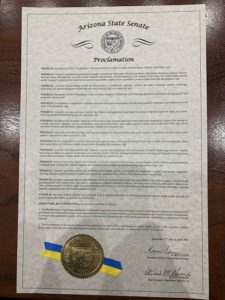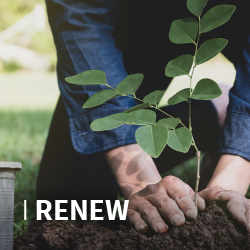While most U.S. workplaces shut down during the initial onslaught of COVID-19 in 2020, ISRI’s advocacy team was working to ensure its members’ businesses could stay open by getting recycling declared an essential business. It was a long but productive year of educating federal, state, and local policymakers. “We learned quickly that a lot of government officials knew very little of how recycling sustains the manufacturing industry and produces materials to meet consumers’ everyday needs,” Danielle Waterfield, ISRI’s chief policy officer, recalls. “We educated policymakers at all levels of government that recycling is critical to the nation’s infrastructure and the importance of keeping ISRI members’ doors open.” Those efforts bore fruit when recycling was recognized as essential in nearly every state when federal guidance declared supply chains critical to the nation’s manufacturing infrastructure.
“We learned a lot of lessons from the pandemic,” says Justin Short, ISRI’s manager of government relations. “One was how to continue operations when everything is closed besides essential services. People don’t think about what happens if there’s no place to take the blue bins, and that’s just the residential side.”
Following that big win for the industry, ISRI’s advocacy team approached 2021 with a new, related mission: pushing the message “Recycling Is Essential” into state legislatures. As 2020 ended, a group of ISRI member legislative advocates approached Waterfield with a plan to raise awareness in state legislatures through nonbinding resolutions or similar measures applauding the industry’s efforts during the pandemic.
“We received a recycling resolution drafted for the Georgia legislature,” Waterfield says. “The purpose was to give Georgia lawmakers a positive, feel-good measure they could vote for in support of their constituents.”

Recognizing the essential nature of recycling was a message that could be carried to many states. “The idea was to acknowledge recyclers in the state who were critical during the worst of the pandemic in keeping the state’s manufacturing supply chain operational and give credit to policymakers who supported the industry,” Waterfield says. “We wanted to replicate this concept nationwide, collaborating with the ISRI chapters and their state lobbyists.”
Resolutions require time, commitment, and legwork, which ISRI members gave willingly. “We opened up the resolution to our State Subcommittee, allowing everyone across the commodities to comment and add language,” Waterfield says. “The original Georgia resolution served as a template for the others that would follow.”
To help facilitate passage of as many resolutions as possible, ISRI designed its first continuing education course for state lobbyists around the message. The advocacy team instructed attendees about the importance of the message, lessons learned from 2020, and why this issue affects all commodities. “It was imperative that every lobbyist understood how recycling, of all commodities, is essential to the nation’s infrastructure, sustaining manufacturing and providing materials consumers need every day,” Waterfield says. “We learned the hard way that policymakers, particularly those issuing executive orders, did not clearly understand why recycling is essential and we cannot make that mistake again.”
Most proclamations designating recycling as essential came from advocacy efforts within the states’ executive branches, so it was a no-brainer for the advocacy team to make 2021 the year of the legislature. “Legislators also needed to hear the message that recycling provides for the creation of essential products that we use in our everyday lives and helped us weather the COVID-19 crisis,” Waterfield says.

Eleven states—more than twice the original goal—passed resolutions or similar measures in support of recycling. All commended the essential role of recycled commodities—including steel, paper, electronics, aluminum, plastics, textiles, tires, and glass—in supplying manufacturers during COVID-19 and as feedstock for vital products like hospital gowns, toilet paper, and respirators. States also recognized recyclers’ role in supplying used auto parts, allowing drivers to access affordable repairs and maintain reliable transportation.
“Resolutions require legwork,” Waterfield says. “And we had really good lobbyists who did that legwork” The resolutions got legislators talking and thinking about the message, giving them a better understanding of the industry’s economic and environmental contributions. “Hopefully, the next time impactful legislation comes across their desk, policymakers remember ISRI and its members,” Waterfield says.
The advocacy team wants to continue the push in 2022 with an updated look and feel. “Truth be told, recycling is essential and critical to the future of our planet,” Waterfield says. “Our industry is researching and developing ways to recycle new products using innovative technologies and working with manufacturers with design for recycling in mind.”
Short agrees. “We’re glad recycling was declared essential for the pandemic,” he says. “But it’s important to ensure recycling is recognized as a sophisticated essential business that is advancing global sustainability.”
The advocacy team is planning for more lobbyist training sessions in 2022. ISRI’s State Subcommittee will form a working group to identify two or three priorities for the lobbyists centered on industry topics they will likely see on legislative agendas this year.
“The goal is to help educate our lobbyists on the scope and breath of the industry,” Waterfield says. “And understand how a lot of the topics and subjects are connected to one another. Metals theft is a priority issue, ISRI can help connect that issue to other industry concerns a lobbyist may not be familiar with.”
2022 will feature advocacy training courses for ISRI members, ideally both an online training option and in-person visits to various chapters. The online training will serve as “Advocacy 101,” helping members develop universal advocacy skills and get more comfortable talking to legislators. In-person sessions will be focused on state-specific issues and legislative priorities. “We’re planning for in-person training in collaboration with ISRI chapters interested in state capitol fly-ins with state lobbyists available to assist with the chapters’ state legislative issues/priorities, and the online training will serve as a convenient option for members who may just be starting out in advocacy,” Waterfield says.
Featured image courtesy of King of Hearts, CC BY-SA 4.0 <https://creativecommons.org/licenses/by-sa/4.0>, via Wikimedia Commons. Caption: Massachusetts State House. Body image 1 courtesy of Ken Lund, CC BY-SA 2.0 <https://creativecommons.org/licenses/by-sa/2.0>, via Wikimedia Commons. Caption: Georgia State Capitol. Body image 2 courtesy of ISRI. Caption: A photo of the Arizona resolution.
Additional Resources













